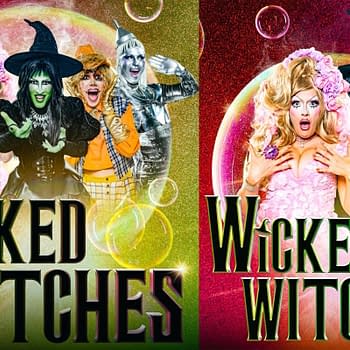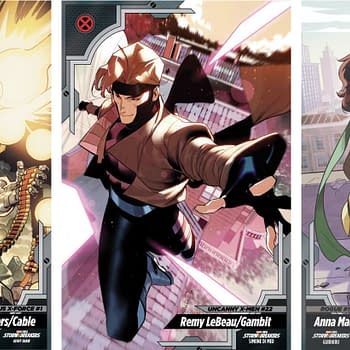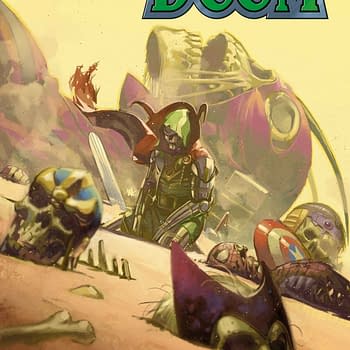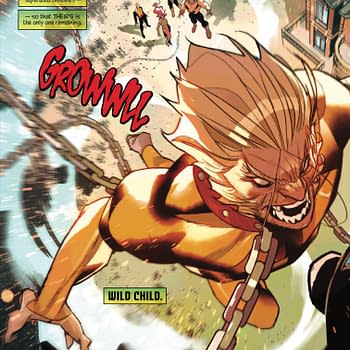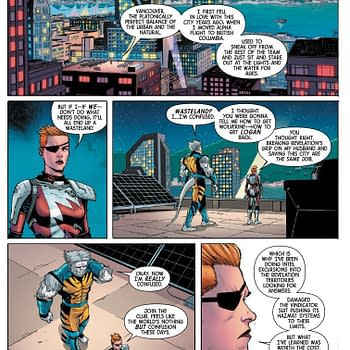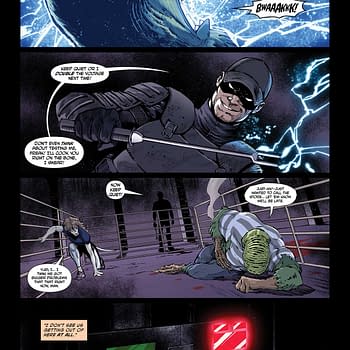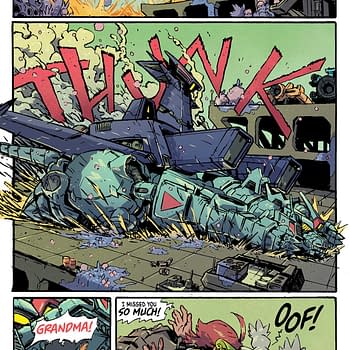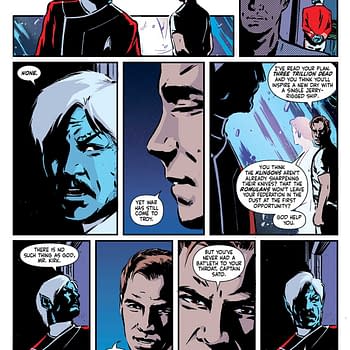Posted in: Comics | Tagged:
For Those People Who Say San Diego Comic-Con Isn't About The Comics Anymore…
It's a familiar cry. Comic-Con isn't about comics anymore. There are no comics there anymore, it's just films, TV, games and toys. You'll get more comics content at other American shows that focus on the comics. So if you like comic books don't go to San Diego Comic-Con anymore.
And they are, utterly, to a person, wrong. Because yes there are lots of films, TV, games and toys content and coverage and booths and cosplay, and events around the show and around the city and you can go the entire day without even seeing a comic book.
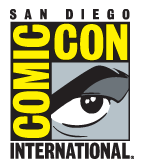
And then there's the Comics Arts Conference. The serious business and analysis of comic books, running through the show. You can pretty much guarantee a seat at every presentation, and you will get more out of this than any line for Hasbro's My Little Transformer exclusives.
Check the programme below. There are just a fraction of the many highbrow comic book panels during the show – but these are academically certified. You can come out of this thing with a degree…
Thursday, July 20
10:30am
Comics Arts Conference #1: International Issues
Phillip Vaughan (University of Dundee) examines the troubled development and short run of the British horror weekly Scream!, its impact on the British comics industry, and its eventual demise. Andrew Lamprecht (University of Cape Town) discusses the relationship of past and present in contemporary South African comics and the ways that these comics reflect concerns, fears, and utopic dreams after apartheid. Nicole Larrondo (Brown University) investigates how the Chilean government is involved in publishing comics and the ways in which comics have been used inside and outside the classroom as a pedagogical tool to encourage the study of Chilean history.
Thursday July 20, 2017 10:30am – 12:00pm
Room 26AB
12:00pm
Comics Arts Conference #2: International Collaborative TransMedia Narrative Comics
The more we build bridges and familiarize ourselves with other cultures, the better we do as a global community. In this spirit, students at Penn State University and the University of Dundee have embarked on a collaborative comics exchange with the mission of telling one story, graphically, in many voices. Emily Steinberg (The Pennsylvania State University, Abington Campus), Chris Murray (The University of Dundee), William Cromar (The Pennsylvania State University, Abington Campus), and Damon Herd (The University of Dundee) investigate the role of comics within a transmedia, trans-Atlantic teaching and research partnership, reflecting on pedagogy and practice.
Thursday July 20, 2017 12:00pm – 1:00pm
Room 26AB
1:00pm
Comics Arts Conference #3: Comics and Literacy
Lisa Smith (Pepperdine University) presents her approach to teaching analytical writing in a first-year composition class using Matt Fraction and David Aja's Hawkeye: My Life as a Weapon, providing practical, constructive advice on how to use comics to improve students' analytical writing skills. Chris Kuhlow (University of Akron) examines her local comic book shop as a sponsor of multimodal literacy and the pedagogical implications of this sponsorship on the teaching of writing in freshman composition. James "Skip" Harvey (University of Missouri School of Journalism) reports on a two-year study investigating the literary practices of high school students working with a local artist to create comics and digital compositions.
Thursday July 20, 2017 1:00pm – 2:30pm
Room 26AB
2:30pm
Comics Arts Conference #4: STEAM(Y) Narratives and Graphic Content in Education
We live in a culture dominated by visual imagery. Because our culture is so hyper-visual, literacy is and should be understood as multimodal. Comics and graphic novels can provide a means by which we can begin to examine these multimodal literacies from an interdisciplinary perspective. Comic corporations such as Marvel, with their STEM challenge for girls, have started to examine these interdisciplinary connections, but more needs to be done in the public school setting. Matthew Sutherlin (Henderson State University), Michelle Johnson (Henderson State University), and Amy Counts (Lakeside Middle School) will focus on three STEAM-Y components of a new educational narrative.
Thursday July 20, 2017 2:30pm – 3:30pm
Room 26AB
Friday, July 21
10:30am
Comics Arts Conference #5: Lassoing the Truth: Marston Versus Wertham in the Wonder Woman War
Psychologist William Moulton Marston created the world's most famous female superhero. Using outdated examples and falsified evidence, psychiatrist Fredric Wertham attacked both Wonder Woman and the deceased Marston in his book Seduction of the Innocent. Doctors Travis Langley and Mara Wood (Wonder Woman Psychology: Lassoing the Truth) call together a panel of experts to examine how one crusader's fight with a ghost affected both comics and comics studies: Phil Jimenez(Wonder Woman), Trina Robbins (The Legend of Wonder Woman), Danny Fingeroth(Superman on the Couch), Alan Kistler (comics historian), and Mike Madrid (The Supergirls), with special guest Christie Marston (Wonder Woman Network and Family Museum). Be a sensation, not sensationalistic!
Friday July 21, 2017 10:30am – 11:30am
Room 26AB
11:30am
Comics Arts Conference #6: Comics Auteurs: Kirby and Eisner at 100
2017 marks the 100th anniversary of the births of comics masters Jack Kirby and Will Eisner, whose contributions to comic books and graphic novels cannot be overstated. Marc Greenberg (Golden Gate University School of Law) discusses how copyright law partially helped the Jack Kirby and Jerry Siegel estates get a second bite at the apple in renegotiating publishing deals. Kim Munson (From Panels to Frames: Comic Art in Museums) looks at how recent art shows contribute to the constant rediscovery and reevaluation of Eisner and Kirby's work. Jennifer Willms(University of Koblenz-Landau) delves into the Eisner's comic compendium of Jewish American history and the immigrant experience.
Friday July 21, 2017 11:30am – 1:00pm
Room 26AB
1:00pm
Comics Arts Conference #7: It Came from the Pulps! The Weird, Lurid Origins of the Comic Book
For 50 years before the birth of the modern comic book, pulp magazines were the predominant source of popular fiction in America. Many of the creators, and readers, of the pulps helped to nurture the nascent comic industry, and their influence and legacy can still be felt to this day. Author Nicky Wheeler-Nicholson (The Texas-Siberia Trail, granddaughter of DC Comics's founder Malcolm Wheeler-Nicholson), Jason Ray Carney (Christopher Newport University), Bram Stoker Award-nominated comic and pulp scholar Jeffrey Shanks (The Unique Legacy of Weird Tales), Patrick Scott Belk(Empires of Print: Adventure Fiction in the Magazines, 1899-1919), and Eisner-nominated comics and pulp historian Nathan Vernon Madison (Anti-Foreign Imagery in American Pulps and Comic Books, 1920-1960) discuss the connections between pulp magazines and early comic books, as well as the relatively recent growth in academic study dedicated to exploring those connections.
Friday July 21, 2017 1:00pm – 2:00pm
Room 26AB
2:00pm
Comics Arts Conference #8: Voices and Visions of Native American Superheroes
Native American heroes' comic book adventures often explore identity and culture. Kerry Fine (Arizona State University) shows how Arigon Starr's reservation hero Hubert Logan, a.k.a. Super Indian, fills a representational gap for the non-native audience while taking up distinctly Native issues in the ongoing fight against injustice. Rebecca Lush (California State University San Marcos) makes the case that Jeffery Veregge's art in Marvel's recent Red Wolf provides a Native inter-text that contrasts with naturalistic narrative panels for commentary on the storyline and characters. Sara Spurgeon (Texas Tech University) argues that Maya Lopez's vision quest in David Mack's Daredevil: Echo Vision Quest is twofold: both a spiritual journey she takes as a Native American guided by the shaman she meets on the reservation and a quest for a visual form of language with which she can communicate as a deaf person in a hearing world, while still maintaining her identity as a Native American in a white world.
Friday July 21, 2017 2:00pm – 3:30pm
Room 26AB
Saturday, July 22
10:30am
Comics Arts Conference #9: Make Ours Marvel: Media Convergence and a Comics Universe
Since the debut of the Fantastic Four in 1961, Marvel has steadily invested in worldbuilding strategies that have in more recent years culminated in the company's globally successful forays into film and television production. Drawing on the anthology Make Ours Marvel: Media Convergence and a Comics Universe (University of Texas Press, 2017), Matt Yockey (University of Toledo), Anna Peppard (York University), and Derek Johnson (University of Wisconsin, Madison) chart significant aspects of the development of the Marvel brand, including Marvel's exploitation of affect to foster brand and reader identities in the 1960s, the company's checkered history publishing comics with strong female protagonists, and Marvel's problematic attempt to widen its reading audience with the "Share Your Universe" campaign.
Saturday July 22, 2017 10:30am – 11:30am
Room 26AB
11:30am
Comics Arts Conference #10: Feminist Marvels
J. Richard Stevens (University of Colorado, Boulder) examines how Marvel is positioning Carol Danvers/Captain Marvel in the lead-up to her film as a credible feminist icon in order to more explicitly address the interests of a rising female readership. Chris Richardson (Young Harris College) argues that Bourdieu's notion of the field, a place in which actors compete for status through symbolic capital, allows us to better understand how Jessica Jones, as a strong, independent, heroic woman, a victim of abuse, a vulnerable and insecure lover, and the product of two men's imagination, has dramatically reshaped the industry in subtle yet important ways. Samantha Langsdale (University of North Texas) sees Marvel's new run of Spider-Woman as feminist in its defiance of the trend in mainstream superhero comics to characterize motherhood as untenable for superheroines by presenting a markedly woman-centered model of motherhood.
Saturday July 22, 2017 11:30am – 1:00pm
Room 26AB
1:00pm
Comics Arts Conference #11: Focus on Eric Shanower
Comics Arts Conference special guest Eric Shanower is the award-winning cartoonist of the graphic novel series Age of Bronze, a retelling of the story of the Trojan War. With cartoonist Skottie Young, he adapted six of L. Frank Baum's Oz books to a series of New York Times bestselling graphic novels. He wrote the Eisner Award-winning comics series Little Nemo: Return to Slumberland with art by Gabriel Rodriguez. Shanower will elucidate the historical research and creative choices involved in crafting his comics. Moderated by Randy Duncan (Henderson State University).
Saturday July 22, 2017 1:00pm – 2:00pm
Room 26AB
2:00pm
Comics Arts Conference #12: The Poster Session
The CAC's poster session gives attendees the opportunity to interact directly with presenters. Come talk one-on-one with these scholars about their projects! Plashka Webster, Victoria Sanchez, Grace Toyonaga, Tiana Mamaghani, Ashley Jabro, Zachary Brown, and Timothy Stiven present the student-designed graphic novel Windy and the Spirit Skies and share the process the students and faculty went through to create this project. Danielle Kohfeldt, Maricela Correa-Chavez, and Julia Stern examine how people occupying subordinated social identities experience and co-create fan culture in comic fandoms. Derek Heid traces a high school comics studies course from its inception to its present-day status as a class awaiting approval, including the obstacles its creators have experienced along the way. John A. Walsh presents the results of a study conducted with Shawn Martin and Jennifer St. Germain of the key features of fan mail published in The Amazing Spider-Man from 1963 until the present. Allen Thomas outlines potential research and theories examining how and why comics can aid in the psychotherapeutic process. Jeffrey Goodwin discusses how Sabrina the Teen-Age Witch queers the Archie Universe by setting itself up in opposition to capitalist, patriarchal society. Megan Sinclairanalyzes the role of comics in education by addressing the genres of graphic medicine and the superhero. Matthew J. Brown compares six versions of Wonder Woman's origin story and how these versions combine progressive and problematic representations. Tiffany Babb examines why Noelle Stevenson's Nimona is so unacceptable to her society and why an uncontrollable young girl who refuses to fit into the moral and societal rules of a story is so terrifying. Craig K. Agule and Benjamin G. Barrena use Ian Williams's The Bad Doctor to argue that practical and ethical questions raised in cases of physicians who are also patients are best answered by looking at narratives. Voski Hovsepian and Kristal Samson explore the meaning and clinical presentation of dissociative amnesia through Barry Allen's experience in Flashpoint. Joseph Serrano presents the results of a qualitative study on the perceived influence of comic books on moral development during adolescence. Trevor Alvord examines how the Book of Mormon, the most sacred text in Mormonism, has been transformed into comic form 11 times. Jason Goldman-Hall, Courtney Arndtt, Alexander Diep, and Jenny Kim discuss concrete strategies for using comics and graphic novels to teach English, social science, and special education. Elizabeth Frechette, Elica Sharifnia, and Silvia Niño review how comic books meet the Kindergarten through 3rd grade nationally recognized Common Core and Next Generation Science Standards and provide guidelines for how teachers can begin to incorporate comic books into their science curriculum. Barbara Glaeser and Brenda Bush present the results of a study in which graphic novels were used to help adolescents with autism build bridges to reading for enjoyment and learning, which led to improved peer relationships. Cathy Leogrande examines the historical timeline of Asian characters in DC and Marvel comics. Eric Bruce presents the results of study with Shawn Sellers and Janet Roberts analyzing Batman using SAMHSA Wellness Initiative, identifying Batman's current status and health risk factors within the eight dimensions of wellness. Peter Carlson and Antero Garciadocument the impact a critical pedagogy of comic books has had on disenfranchised, struggling, and historically marginalized readers. Ann Thresher examines the surprisingly rigorous engagement of comic writers with the philosophy and physics of time.
Saturday July 22, 2017 2:00pm – 3:30pm
Room 26AB
Sunday, July 23
10:30am
Comics Arts Conference #13: Other Voices, Other Histories
Braeden Jones (University of Iowa) discusses the ways in which creators of selected didactic comics from Spain, the U.S., and Mexico modified complicated historical facts to present different ideological interpretations of the conquest of Tenochtitlan. Clarissa Goldsmith (Arizona State University) draws from narratological and borderland theory to analyze how Relampago, the Invincible Man, and El Gato Negro reimagine the superhero genre to address social concerns within the Chicanx community. Dwain C. Pruitt (University of Louisville) traces the development of DC Comics's black heroes as pseudo-Muslims, from the misunderstanding of African American cultural politics in the 1960s and 1970s to African American creators of the Milestone Comics imprint, and highlights 1978's Superman vs. Muhammad Ali as a turning point.
Sunday July 23, 2017 10:30am – 12:00pm
Room 26AB
12:00pm
Comics Arts Conference #14: The Value of Mental Illness and Trauma: Finding Resilience in Pain
Superheroes are known for their traumatic pasts and for regularly enduring painful beatings. The question of how this affects their personalities is explored by Patrick O'Connor (The Chicago School of Professional Psychology), Cara Battistella(University of Pittsburgh), and Sean B. Knuth (SBKPhD). Citing recent neurotrauma research, they discuss mental illness and head trauma through recent stories of Batman, Spider-Man, Jessica Jones, Black Widow, and others. Additionally, panelists discuss how these events factor into increasing violent behavior. Panelists will also consider treatment options and how seeking treatment could affect the futures of these characters. If a superhero sought therapy, would they no longer seek justice?
Sunday July 23, 2017 12:00pm – 1:00pm
Room 26AB
1:00pm
Comics Arts Conference #15: Fangirls
Angela Chiarmonte (University of Colorado Boulder) analyzes how Ms. Marvelresonates with the Millennial generation by rejecting and subverting stereotypes of Millennials. Caitlin O'Shea (Reed College) addresses how women as comic fans, retailers, and creators navigate a space that is traditionally masculine and hostile to their gender. Angelica Kalika (University of Colorado Boulder) uses fan interpretations of Spider-Gwen texts to define Spider-Gwen's connection to feminist and millennial speech communities.
Sunday July 23, 2017 1:00pm – 2:30pm
Room 26AB
2:30pm
Comics Arts Conference #16: The Culture of Comic-Con: Field Studies of Fans and Marketing
Comic-Con offers students of popular culture an amazing venue to study how culture is marketed to and practiced by its fans. Jesse Booker (Radford University), Blythe Bull (Hendrix College), Borin Chep (University of Nebraska at Omaha), Conner DuRose (Radford University), Kristi Fleetwood (City University of New York), Carlos Flores (Arizona State University), Kyle Hanners (California State University, Sacramento), Sarah Irby (Lynchburg College), Morgan Mitchell (Wittenberg University), and DeAnna Volz (Wittenberg University) present initial findings from a week-long ethnographic field study of the intersection of fan practice at the nexus of cultural marketing and fan culture that is Comic-Con 2017. Matthew J. Smith(Radford University) moderates.
Sunday July 23, 2017 2:30pm – 3:30pm
Room 26AB






